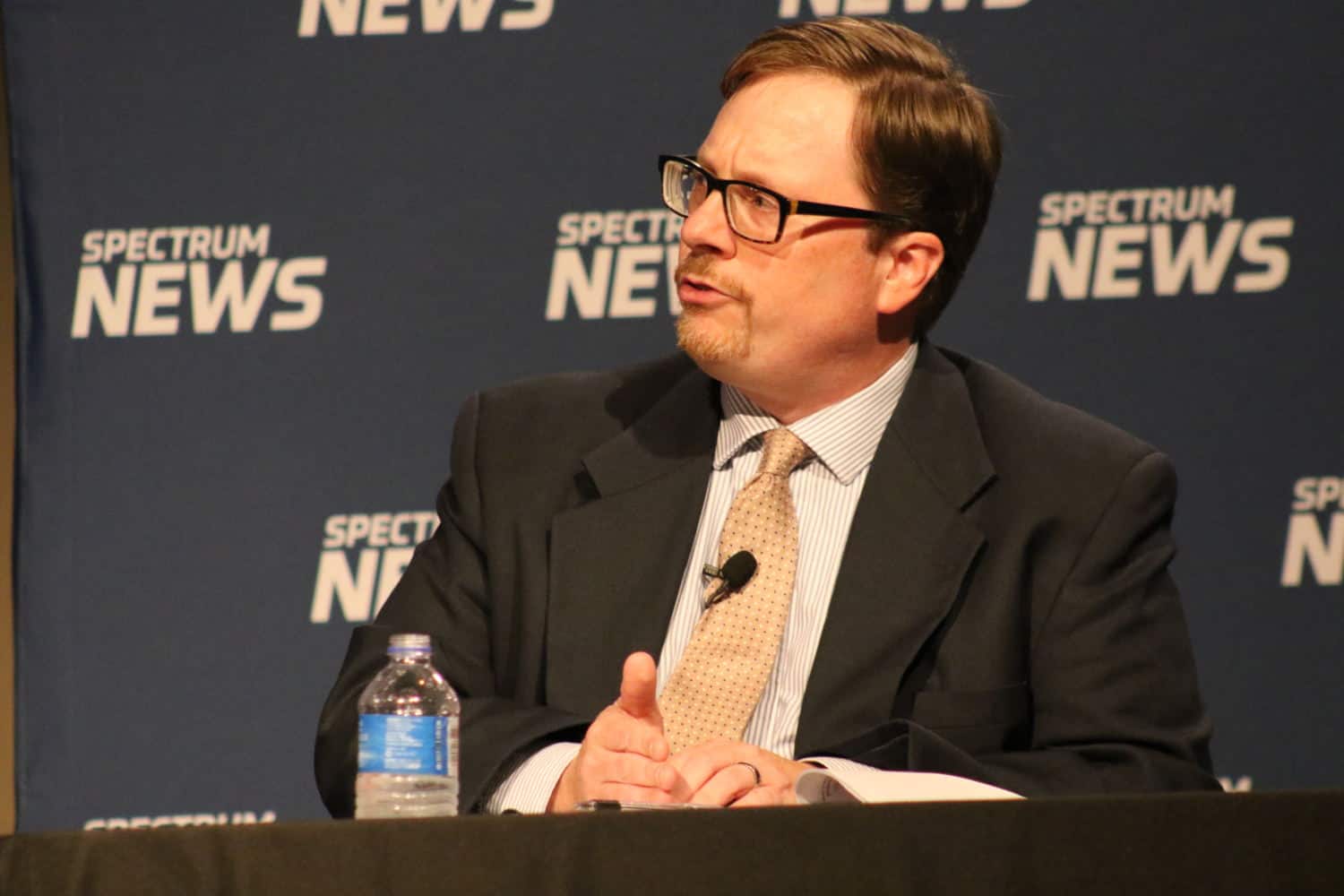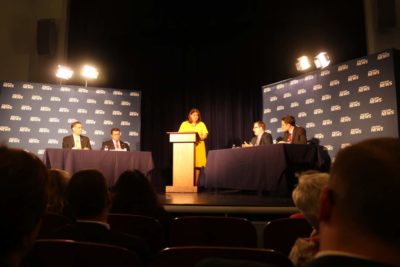In a debate Tuesday night in Newton, thought leaders from across the political spectrum agreed that differentiated pay for teachers could improve teacher effectiveness and benefit students.
Each of the four participants’ arguments, however, had caveats. The debate about merit-based teacher pay included Rep. Craig Horn, R-Union; Mark Jewell, president of the North Carolina Association of Educators; Terry Stoops, John Locke Foundation’s vice president of research and director of education studies; and Kris Nordstrom, education finance and policy consultant for the NC Justice Center’s Education and Law Project.
From the beginning of the night, Horn emphasized a need for intentionality in choosing how the state defines and rewards teacher quality.
“Does that mean pay for improved student outcomes?” Horn said. “Does it mean pay for taking on additional responsibility? What does performance mean and how is that performance going to be measured? We certainly don’t want to get into a situation, in my opinion, where additional pay is based solely on test outcomes.”
Stoops, who stressed the need for competition in the teaching profession, also said a differentiated compensation system should be based on factors other than raw test scores, like growth.
“There’s no relationship between socioeconomic status and growth measures that we have, so it seems to me that if we’re going to start anywhere, let’s start with the growth measures — the expectations that we have with teachers to at least impart one year’s worth of growth — and then build out from there,” Stoops said.
Nordstrom, who questioned how much differentiated pay would improve teacher outcomes, agreed that growth better reflects a teacher’s effectiveness than pure achievement. He added, however, that some teachers have been vocal about problems with how the state calculates growth, through a system called EVAAS. Find an in-depth explanation of EVAAS here.
“A lot of teachers don’t necessarily trust the formula,” Nordstrom said. “Second, still at the end of the day, it’s a formula based on the narrow set of skills measured by standardized tests rather than all of the things we want our students to learn.”
He pointed to reports from teachers like Justin Parmenter who said he was unclear how his teaching was being evaluated from year to year.
“According to their experience, it can tell you you’re a great teacher one year and tell you you’re terrible the next,” Nordstrom said.
Jewell focused on issues within the current salary schedule, arguing that more money for all teachers is needed before considering differentiated pay for certain individuals.
“We do need to fix the base,” Jewell said. “When folks are making $35,000, you know, and putting in 10-hour workdays, and then going to their second job at the mall afterwards, then coming home and grading papers, and then doing weekend activities at the school, that’s exhaustion. That’s when we burn out, and it’s not being paid as a professional there.”
Nordstrom similarly criticized the legislature’s Republican leadership for not investing more in the public school system as a whole, saying the General Assembly has focused on tax cuts for corporations and the wealthy in recent years. He pointed to a recent nationwide analysis by the Rutgers Graduate School of Education that gave North Carolina an “F” on education funding relative to its gross state product.
Jewell also expressed concern about the effects paying some teachers more than others could have on the workplace environment.
“The school community is a community where we all move together with the same goal in mind, and that’s the children in our schools,” he said. “If you ask teachers there if they want to be paid based on their test scores, they would tell you, ‘No, I work just as hard as my colleague across the hall.'”
Horn said he believes teachers would improve their work when given financial incentives. He said that includes collaborating with their colleagues.
“I don’t buy the fact that we’d lose collaboration because I think teachers, inherently, part of the teaching process is collaboration,” Horn said. “What we have to learn in the legislature is that collaboration is every bit as important, maybe even more important, than being in front of kids.”
Stoops argued teachers, like other professionals, want to both compete and collaborate.
“This idea that the school is a harmonious community and that teachers aren’t competing with one another is patently false,” he said. “Teachers are constantly competing with one another. They want to outdo each other. They want to be a better teacher than the teacher down the hall. That doesn’t mean they’re not going to collaborate.”
Nordstorm mentioned the differentiated pay used statewide to reward reading and math teachers for students’ growth in certain grades, as well as career and technical education (CTE) and advanced placement (AP) teachers. All four participants agreed that teacher buy-in is necessary for a successful program.
“All of them are top-down approach,” he said. “They have individual teacher-based rewards rather than team-based incentives. So they don’t follow some of the best practices that Representative Horn has identified tonight. I think that’s a shame.”
When asked if the existing programs were working, Stoops said an effective system should satisfy the specific needs of the area.
“We have to really think about our unique circumstances, what’s going on in school districts, what’s going on in schools. and then tailor a program that meets those needs,” he said.
“I think the time is now to transform the system that we have, the antiquated, centuries-old system, into a comprehensive human-resources-type plan where we really maximize the potential of the teachers that we have.”
Spectrum News senior political reporter Loretta Boniti moderated the debate, which was hosted by the North Carolina Institute of Political Leadership as the last in a three-part debate series in smaller towns and cities across the state.
Correction: A previous version of this article misidentified the differentiated pay programs Kris Nordstrom referred to in the Newton debate.



